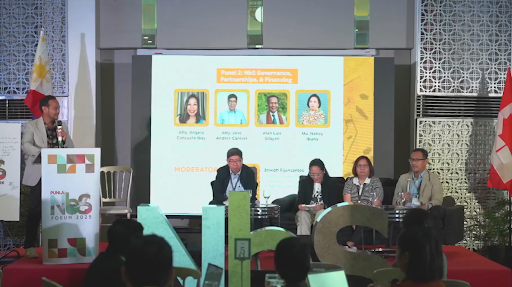First Gen-EDC champions biodiversity and clean energy at PUNLA Forum
- October 27, 2025
- 0

First Gen–owned Energy Development Corporation (EDC) highlighted the growing convergence between renewable energy and nature conservation at the PUNLA Multistakeholder Forum, which marked the launch of the Nature-based Solutions (NbS) Support Network. As the sole private sector representative at the event, EDC shared how it integrates biodiversity protection into its clean energy operations to promote climate-resilient growth.
The event, held last September, gathered key organizations including the Department of Environment and Natural Resources, Forest Foundation Philippines, the Government of Canada, development agencies, academia, and local communities to foster stronger collaboration in advancing NbS initiatives across the country.
EDC Corporate Relations and Communications Head Maria Nancy P. Ibuna represented the company as a panelist in the session on governance, partnerships, and financing. She discussed how First Gen–EDC integrates biodiversity conservation into its renewable energy operations, thus balancing clean energy production with the protection of vital ecosystems.
Ibuna presented the rich biodiversity surrounding EDC’s project sites, which cover key biodiversity areas, forestlands, and habitats for several species. Among the flagship species she highlighted were the Golden-crowned flying fox, Mapilig, Philippine warty pig, Katmon Bayani, Visayan hornbill, Red Lauan, Apo Myna, and Almaciga — all symbols of the ecological importance of EDC’s operating sites.
At the core of EDC’s sustainability efforts is BINHI, the company’s flagship environmental program focused on forest protection, restoration, mainstreaming native trees, and biodiversity conservation. BINHI is aligned with the Philippine Biodiversity Strategy and Action Plan, the United Nations Sustainable Development Goals, and International Finance Corporation standards. It serves as one of the country’s most comprehensive reforestation and ecosystem restoration models, designed to drive both environmental and social progress.
A key success story was from Mt. Apo Geothermal Project which showcased the measurable impact of EDC’s approach. From only 28 recorded fauna species in 2006, the site now supports 304 species — nearly half of which are endemic to the Philippines and Mindanao. Ibuna said the findings demonstrate that EDC’s geothermal sites have evolved into thriving biodiversity hubs rather than mere power facilities.
Through its Nature-based Solutions framework, EDC continues to advance as a global renewable energy leader that generates clean power while safeguarding natural habitats. The company currently operates a total installed renewable capacity of 1,388.8 megawatts, accounting for 17% of the country’s total renewable capacity. Its 1,094.80-megawatt geothermal portfolio represents 56% of the Philippines’ installed geothermal capacity, making the nation the third largest geothermal producer in the world.
How do you think partnerships like these can help strengthen the link between clean energy and environmental conservation?
Follow Power Philippines on Facebook and LinkedIn or join our Viber community for more updates.